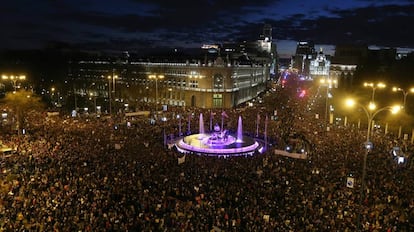Massive marches in Spain display the strength of the feminist movement
Demonstrations called on Friday, International Women’s Day, brought out an estimated 350,000 protestors in Madrid and 200,000 in Barcelona

One year ago protestors took to the streets of Spain on March 8, International Women’s Day, to demonstrate against the slow pace of change toward equality. This year, not only was the scene repeated across the country, but the achievement was actually greater. From Cádiz, Bilbao and Palma de Mallorca, to Santa Cruz de Tenerife and Vigo, there was a huge turnout at the planned marches on Friday evening. According to various government delegations, there were between 350,000 and 375,000 people present in Madrid (last year the estimate was 170,000), and 220,000 in Valencia. In Barcelona, the local police estimated a total of 200,000 participants.
For the second year running, the day included a full strike aimed at female workers as well as students, or two-hour stoppages. Despite the difficulty in measuring the observance of such action, the strength of the mobilization in Spain would appear to be unique the world over, turning the country into a leader when it comes to drawing attention to the feminist struggle.
In the last 12 months in Spain, and despite the arrival of a Socialist Party (PSOE) government that brought with it 11 female Cabinet ministers out of a total of 17, there have been no real advances in fundamental issues such as gender violence, the pay gap and access to positions of responsibility – the clear causes of the mobilizations last March and upon which there has been much debate in reecent months. But since the rise in support for far-right party Vox, and the subsequent shift toward the right of the conservative Popular Party (PP), debates that appeared to have been laid to rest – such as Spain’s abortion law – have once again reopened. This political climate contributed to the mass support that the marches and strike action called for Friday received, with the demonstrations taking place under the slogan “We have 1,000 reasons.”

Protest against the PP
Earlier in the day, in Castellón (Valencia), a group of protestors prevented the president of the Popular Party (PP), Pablo Casado, from delivering a speech ahead of the campaign for local and regional elections. A group made up mostly of women banged pots, blew on whistles and shouted out messages such as: “You are the patriarchy!” and “Casado, you machista, you’re on our list!” The PP leader has openly criticized “leftist feminism” and said he would not attend today’s march in Madrid because he claims it has been co-opted by the political left.
Street demonstrations got underway earlier on Friday in many other parts of Spain. “We want your respect, we don’t want your compliments,” chanted protestors in Madrid’s central Puerta del Sol square.

“The problem is that women are expected to work as though they didn’t have children, and to raise children as though they didn’t have to work,” said Claudia González, a worker from Seville who marched on Friday.
Young and feminist
Young women are also the majority when it comes to the section of the Spanish population that sees itself as feminist: just over 64% of the under-25s declared themselves to be feminists in a survey carried out by 40dB for EL PAÍS on the resurgence of the movement. And it is this group that was most visible at today’s protests and work stoppages.
In the Basque Country, tens of thousands of women, many of them students, filled the streets of Bilbao, the region’s biggest metropolis. There was also a large turnout in Vitoria.
There were additional demonstrations in Pamplona, Málaga, Palma de Mallorca and Santa Cruz de Tenerife. In the southern region of Andalusia alone, a total of 139 protests had been authorized.
The teaching sector was particularly involved in Friday’s events. After collating data from a number of Spain’s regions, the state teaching federation from the CC OO union put the observance of the strike at more than 80% at universities. “In secondary schools the figure is 61% and in primary schools 42%,” the union added.
With reporting from Juan A. Aunión (Madrid), Javier Martín-Arroyo (Seville), Manuel Planelles (Madrid), Pedro Gorospe (Bilbao), Alejandro Fernández (Madrid), Manuel V. Gómez (Madrid), Alfonso L. Congostrina (Barcelona), Grego Casanova (Barcelona), Nicolás Pan-Montojo (Madrid), Oriol Güell (Barcelona), Javier Arroyo (Granada), Nacho Sánchez (Málaga) and Jesús A. Cañas (Cádiz).
Tu suscripción se está usando en otro dispositivo
¿Quieres añadir otro usuario a tu suscripción?
Si continúas leyendo en este dispositivo, no se podrá leer en el otro.
FlechaTu suscripción se está usando en otro dispositivo y solo puedes acceder a EL PAÍS desde un dispositivo a la vez.
Si quieres compartir tu cuenta, cambia tu suscripción a la modalidad Premium, así podrás añadir otro usuario. Cada uno accederá con su propia cuenta de email, lo que os permitirá personalizar vuestra experiencia en EL PAÍS.
¿Tienes una suscripción de empresa? Accede aquí para contratar más cuentas.
En el caso de no saber quién está usando tu cuenta, te recomendamos cambiar tu contraseña aquí.
Si decides continuar compartiendo tu cuenta, este mensaje se mostrará en tu dispositivo y en el de la otra persona que está usando tu cuenta de forma indefinida, afectando a tu experiencia de lectura. Puedes consultar aquí los términos y condiciones de la suscripción digital.








































